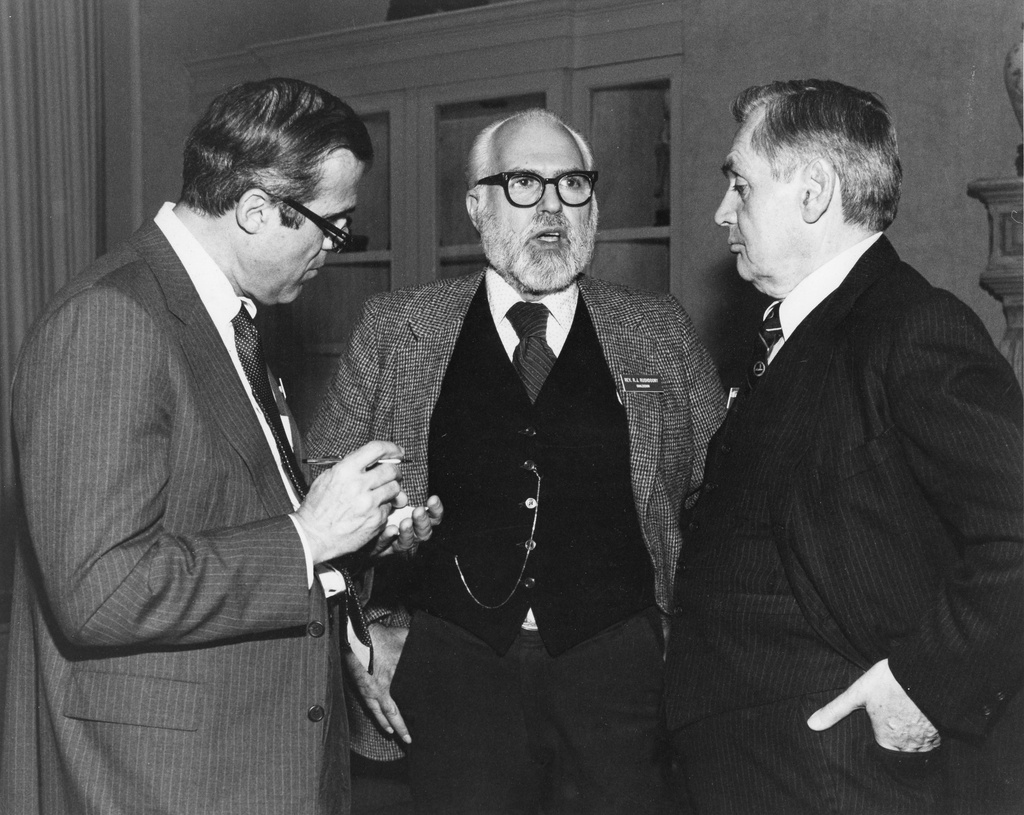
Publisher’s Foreword: Chalcedon
The story of Chalcedon is really my life’s story. Being an Armenian, many of whose family members died for the faith, and coming from a long line of clergymen, the faith was identical to life for me. Before my birth, I had been dedicated to Christ’s service by my parents.

- R. J. Rushdoony
October 1995
The story of Chalcedon is really my life’s story. Being an Armenian, many of whose family members died for the faith, and coming from a long line of clergymen, the faith was identical to life for me. Before my birth, I had been dedicated to Christ’s service by my parents.
America was for us almost a paradise, a land of freedom and joy. We reveled in its richness. None could have been more patriotic than we were. There was so much to appreciate and be grateful for in America’s history. There were, however, disturbing things also.
An incident occurred when I was perhaps ten or eleven years old which until now I have never mentioned or discussed with anyone. A neighborhood boy, a superior mind, a happy, redheaded, and sparkling person, asked if I might be permitted to attend an afternoon film showing. This was in the day of silent films. The picture was of no importance, essentially trifling entertainment, but it suddenly overwhelmed me with a shocking realization. For all those in the film, there was no God, no Christ. They lived in a meaningless and empty world. This filled me with a great horror. Is this how most people live? Are they dead to God? Are they going through life as sleepwalkers? The film was an awakening to an empty world. I did not sleep well that night. I read the newspaper the next day with recognition that men were blotting God out of their world, and it made me fear for the future. I did not know the answer to what I saw, but I sensed that I was somehow in a dying world, or a burning building.
As a university student about a decade later, I was increasingly aware of the cultural love of death, and I began to realize that I, as a Christian, had a responsibility to build the culture of life, the world order of the triune God. I spent much time in the library stacks reading extensively in history, anthropology, and more, and in studying the answers given in literature. I knew something had to be done to make Christianity and His law-word relevant to every area of life and thought or else Christianity would wither into a meaningless “spiritual” religion unrelated to the Bible.
Long before I had given a name to what I wanted to do, i.e., Christian Reconstruction and Chalcedon, I was thinking constantly about the Bible and its answers. I was always reading and rereading the Bible. Before I was ten, a fine old man, an old line New Englander, had warned me once that I was “too young” to be reading much of the Old Testament, but I found it too intensely interesting even to think of stopping.
And so we started Chalcedon, Dorothy and I. I had many ambitious ideas as to what it should be, but people were uninterested in all of them, and thus we began with a mimeographed letter which in its first issue was optimistically run off to the tune of sixty copies, one sheet only. Mrs. Grayce Flanagan ran it off; and for some years, together with the tape ministry, it was her work, aided by Dorothy, that very substantially made Chalcedon possible.
Chalcedon has a very simple premise: If God is indeed the God revealed in Scripture, then His law-word is relevant to and governs every area of life and thought. In polytheism, there are many gods, each governing a limited sphere, some the weather, others farming, others childbirth, still others spiritual concerns, and so on and on. Antinomians and “spiritual Christians” have reduced Christianity to a polytheistic faith, with a limited sphere of relevance for Christ. I regard this as blasphemous. Christ is King over all kings, and Lord over all lords, the only Potentate (1 Tim. 6:15). To limit the scope of His government, and the governing application of His law-word, is to deny Him.

- R. J. Rushdoony
Rev. R.J. Rushdoony (1916–2001), was a leading theologian, church/state expert, and author of numerous works on the application of Biblical law to society. He started the Chalcedon Foundation in 1965. His Institutes of Biblical Law (1973) began the contemporary theonomy movement which posits the validity of Biblical law as God’s standard of obedience for all. He therefore saw God’s law as the basis of the modern Christian response to the cultural decline, one he attributed to the church’s false view of God’s law being opposed to His grace. This broad Christian response he described as “Christian Reconstruction.” He is credited with igniting the modern Christian school and homeschooling movements in the mid to late 20th century. He also traveled extensively lecturing and serving as an expert witness in numerous court cases regarding religious liberty. Many ministry and educational efforts that continue today, took their philosophical and Biblical roots from his lectures and books.